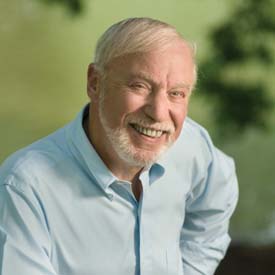Center bridges the gap between Rutgers and Washington
Jeremy Broadus, a political science major at Rutgers, is getting an outside-the-classroom and inside-the-beltway look at politics in the real world.
Broadus, a junior, is spending spring semester in Washington, D.C. where he attends congressional hearings, meets with law-makers, and discusses lobbying strategy with executives for some of the nation’s top financial institutions.
“I’ve met (House) Speaker (John) Boehner,” Broadus said. “I’ve met a lot of senators; a lot of CEOs. It has been amazing.”
The extraordinary access comes through his internship with the Financial Services Roundtable, a Washington-based trade association representing 100 of the leading financial institutions.
But it was the work of another organization – The Washington Center for Internships and Academic Seminars – that bridged the gap for Broadus between Rutgers and the nation’s capitol.
Since 1975, the center has provided internships and seminars to 40,000 college students. Typically, the center, which has a full-time staff of 70, sends representatives to campuses, and then works with prospective interns to find out their interests, background, and skills so they can match them to available internships in the Washington area.
The center has had a long relationship with Rutgers. About 500 students from the university have participated in programs at the center; and Rutgers political science scholar Ross Baker helps lead the center’s annual Inside Washington seminar.
This year the center is recognizing Baker’s contribution by creating a scholarship in his name, which will provide $3,300 to defray the tuition cost for a Rutgers student to attend one of the center’s semester or summer internship programs.

“Ross has been providing his expertise for many years, and we are very appreciative of him,” said Michael Smith, the president of the center.
Baker said he was deeply touched.
“This ties together my life at Rutgers with my extra-curricular work at the Washington Center,” Baker said. “Most of all, it provides a Rutgers student with an opportunity to have an internship in Washington and have some of the cost defrayed.”
Currently, the center serves about 1,600 students a year with internships and seminars.
Smith said one of the center’s strengths is to pinpoint students’ interests and abilities and then find a match from the center’s many contacts in government, non-profit organizations, financial institutions and trade associations.
“We are very labor intensive in finding the right option for students – it’s very much a tailored experience,” he said. “A political science major who has a Spanish minor might get their application sent to the Organization of American States, or the Senate Committee on Foreign Relations, where they could utilize both skill sets.”
Broadus, the Rutgers student, said the center identified several possible internships based on his background.
“I told them I was interested in interning on the Hill or in the lobbying aspect, but that I wanted to work with financial services,” Broadus said. “I got placed in pretty much the perfect internship.”
A former intern from Rutgers said his experience led directly to a career in Washington. The 2007 alumnus, whose name is also Michael Smith, said he interned at the Council of State Governments, and landed a job at the organization after graduation. He is now working as development manager for the Center for American Progress.
“I never would have ended up in D.C. if it wasn’t for the (Washington Center),” he said. “I would have had no idea what it was like living and working there.”